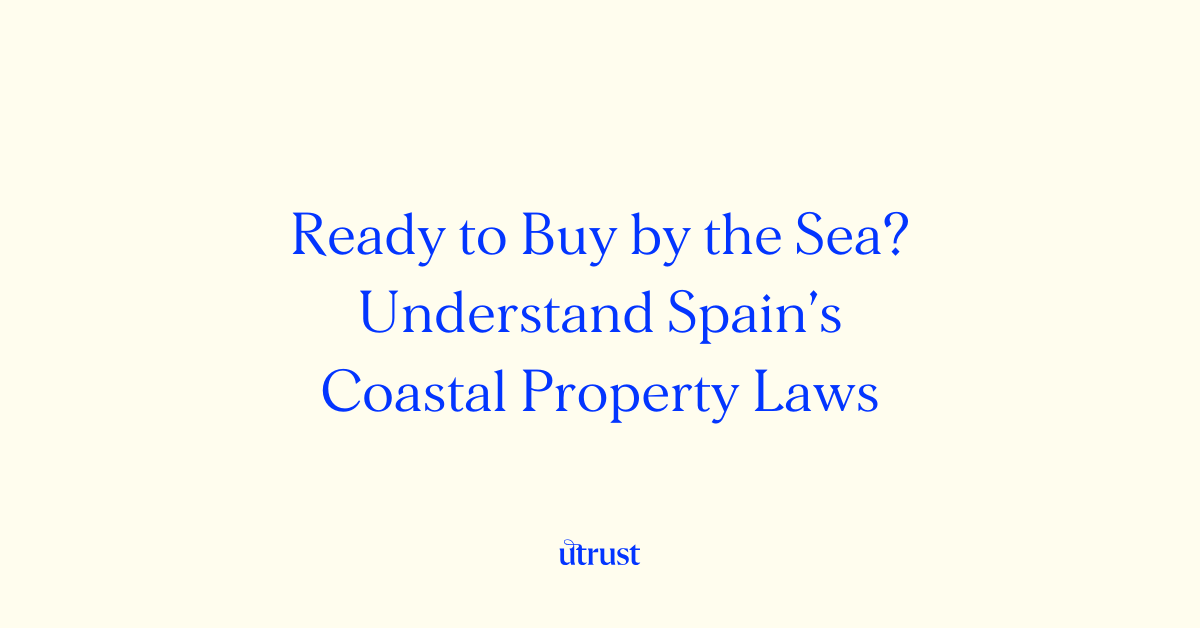Spain’s coastal regions are among the most desirable locations for property buyers, offering stunning views, a relaxed lifestyle, and close proximity to the sea. However, purchasing a property near the coast in Spain comes with legal considerations, particularly concerning Spain’s Ley de Costas (Coastal Law). In this post, we’ll break down the crucial coastal regulations that every buyer must understand to ensure a smooth property purchase.
Spain’s Ley de Costas (Coastal Law) and Its Impact on Property Buyers
Spain’s Ley de Costas was introduced to protect the country’s coastlines from environmental degradation and overdevelopment. It imposes restrictions and regulations on properties located near the shoreline to preserve the natural beauty and ecological balance of the coastal areas.
Key Legal Considerations Under the Ley de Costas:
1) Building Restrictions
Under the Ley de Costas, new buildings and modifications to existing properties near the coast are subject to strict limitations. For example:
2) Protected Coastal Zones
Many areas along Spain’s coast are designated as protected zones to preserve their natural beauty and biodiversity. These zones come with additional restrictions, such as:
Understanding the full scope of property ownership near the coast is crucial, as non-compliance with regulations can lead to hefty fines, legal issues, and even the demolition of unauthorized structures. If you’re exploring the idea of buying property through a company, make sure to read our Legal Expert Guide.
Key Legal Considerations Under the Ley de Costas:
1) Building Restrictions
Under the Ley de Costas, new buildings and modifications to existing properties near the coast are subject to strict limitations. For example:
- Distance from the Shoreline: There are often restrictions on how close you can build to the coast. New construction may need to be set back a specific distance from the shoreline.
- Renovation Regulations: Renovations to coastal properties may need to adhere to specific environmental standards, such as maintaining the natural landscape and minimizing environmental impact.
2) Protected Coastal Zones
Many areas along Spain’s coast are designated as protected zones to preserve their natural beauty and biodiversity. These zones come with additional restrictions, such as:
- Limited property usage.
- Construction and maintenance restrictions.
- Permits and approvals needed for renovations or developments.
Understanding the full scope of property ownership near the coast is crucial, as non-compliance with regulations can lead to hefty fines, legal issues, and even the demolition of unauthorized structures. If you’re exploring the idea of buying property through a company, make sure to read our Legal Expert Guide.
The Importance of the Urbanistic Certificate (Certificado Urbanístico)
When purchasing a property near the coast, the Urbanistic Certificate is an essential document. It provides confirmation that the property complies with local zoning laws and planning regulations. Without this certificate, it’s impossible to determine:
Before purchasing any coastal property, especially in highly sought-after areas like Marbella or the Balearic Islands, ensuring the Urbanistic Certificate is in order is crucial to avoid future legal complications.
- Whether the property is legally built and located within a permissible area.
- If any future renovations or construction work would be allowed.
Before purchasing any coastal property, especially in highly sought-after areas like Marbella or the Balearic Islands, ensuring the Urbanistic Certificate is in order is crucial to avoid future legal complications.
Environmental Considerations: Assessing the Impact on Your Property
Properties located near the coast often require an Environmental Impact Assessment (EIA) before significant renovations or new constructions can take place. This evaluation assesses the potential environmental risks associated with the planned work and determines if the project can proceed without harming the local ecosystem.
An EIA is particularly important when planning major alterations, such as:
Working with an experienced legal advisor ensures that you comply with all the necessary environmental guidelines.
An EIA is particularly important when planning major alterations, such as:
- Expanding the property.
- Installing new infrastructure or amenities.
- Conducting work that could impact local wildlife and habitats.
Working with an experienced legal advisor ensures that you comply with all the necessary environmental guidelines.
What Happens If Coastal Regulations Are Not Followed?
Non-compliance with Spain's coastal regulations can have serious consequences for property buyers. These include:
- Fines and Penalties: Local authorities can impose fines for unauthorized construction or renovations. These penalties can be substantial and may increase over time.
- Legal Disputes: Property buyers can face legal battles with local authorities or neighbors if regulations are violated. This could lead to lengthy and costly court proceedings.
- Decreased Property Value: Properties that do not comply with the Ley de Costas can suffer from decreased resale potential. Buyers are often wary of properties with unresolved legal issues, making it harder to sell or refinance.
Ensuring a Smooth Purchase with Expert Guidance
At UTRUST, we specialize in providing legal expertise to international investors going through the complexities of Spain’s real estate laws, including coastal regulations. Our experienced team is ready to guide you through the entire property acquisition process, ensuring that your investment is legally sound and hassle-free.
Contact us today at info@utrust.es to get personalized legal guidance for your coastal property purchase in Spain.
Contact us today at info@utrust.es to get personalized legal guidance for your coastal property purchase in Spain.
